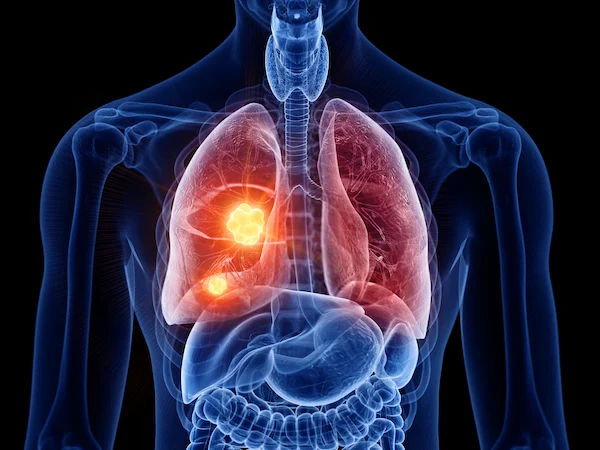Chest Wall Cancer Life Expectancy Overview
Know all about chest cancer life expectancy, its types & symptoms and factors which influence the life expectancy in chest wall cancer.

Written by Dr. J T Hema Pratima
Reviewed by Dr. Rohinipriyanka Pondugula MBBS
Last updated on 29th Jul, 2025

Introduction
Facing a diagnosis of chest wall cancer can be overwhelming, and it’s natural to have questions about life expectancy and what to expect. This article aims to provide clear and compassionate information to help you understand the condition, its impact, and effective ways to manage it.
Understanding Chest Wall Cancer
Chest wall cancer refers to tumours that develop in the bones, muscles, or soft tissues of the chest. These tumours can be primary, i.e. originating in the chest wall or secondary, i.e. spread from other cancers, like breast or lung cancer.
Types of Chest Wall Cancer
1. Sarcomas – Develop in bones or soft tissues (e.g., Ewing sarcoma, osteosarcoma).
2. Chondrosarcoma – Affects cartilage.
3. Metastatic cancers – Spread from other organs (e.g., breast, lung, or prostate cancer).
Symptoms of Chest Wall Cancer
Common signs include:
A noticeable lump or swelling in the chest area
Persistent chest pain that worsens over time
Difficulty in breathing if the tumour presses on the lungs
Unexplained weight loss or fatigue
If you experience any of these symptoms, consult a doctor for further evaluation.
Consult a Specialist of chest for query
Factors Affecting Life Expectancy
Life expectancy in chest wall cancer depends on several factors:
1. Type and Stage of Cancer
Early-stage cancers that are localised have a better prognosis.
Advanced or metastatic cancers may have a lower survival rate.
2. Treatment Response
Surgery, radiation, and chemotherapy can improve outcomes.
Some tumours respond better to treatment than others.
3. Overall Health
Stronger immune systems and better general health improve recovery chances.
4. Age and Genetics
Younger patients often respond better to aggressive treatments.
Genetic factors may influence tumour behaviour.
General Survival Rates
Localised tumours: The 5-year survival rate can be 50-70% with proper treatment.
Metastatic cancer: Survival rates drop significantly, often to less than 30% at 5 years.
These numbers are averages—individual outcomes vary based on treatment and personal health.
Managing Chest Wall Cancer
1. Medical Treatments
Surgery – Removal of the tumour is often the first step.
Radiation Therapy – Used to kill remaining cancer cells.
Chemotherapy – Helps control the spread of aggressive cancers.
Targeted Therapy/Immunotherapy – Newer treatments for certain tumour types.
2. Lifestyle and Supportive Care
Healthy Diet – Focus on protein, fruits, and vegetables to maintain strength.
Gentle Exercise – Light activities like walking can improve energy levels.
Pain Management – Work with your doctor to control discomfort.
Emotional Support – Counselling or support groups can help cope with stress.
3. Follow-Up Care
Regular check-ups and scans are crucial to monitor for recurrence.
When to Seek Help?
If you or a loved one has been diagnosed with chest wall cancer, early intervention is key. Apollo 24|7 offers expert consultations and diagnostic tests to help manage the condition effectively.
Final Thoughts
While chest wall cancer is a serious condition, advances in treatment offer hope. Staying informed, following medical advice, and maintaining a positive lifestyle can make a significant difference.
Consult a Specialist of chest for query
Consult a Specialist of chest for query

Dr. Hyder
Pulmonology Respiratory Medicine Specialist
5 Years • MBBS, MD (PULMONOLOGY)
Guntur
Kalam chest and multi-speciality clinic, Guntur

Dr. Bhupendra Ajit Vala
Pulmonology Respiratory Medicine Specialist
7 Years • MBBS, DTCD, DNB
Vadodara
Happy Lungs and Sleep Clinic, Vadodara

Dr. Deepanshu Chawla
Pulmonology Respiratory Medicine Specialist
3 Years • MBBS, MD Respiratory Medicine
New Delhi
CHAWLA CLINIC, New Delhi
Dr. Lokesh Kumar Garg
Pulmonology Respiratory Medicine Specialist
15 Years • MBBS,DTCD,PGDS
Faridabad
Arsh Hospital, Faridabad

Dr. Tikly Das
Pulmonology Respiratory Medicine Specialist
7 Years • MBBS, Diploma in Tuberculosis and Chest Diseases
New Town
Dr Tikly Das' Clinic, New Town

